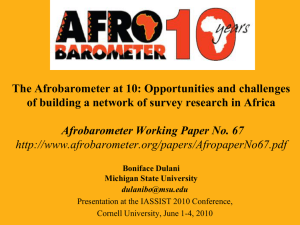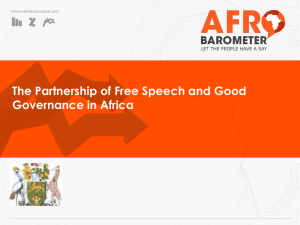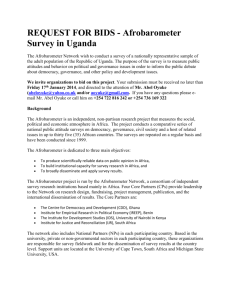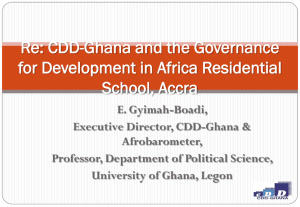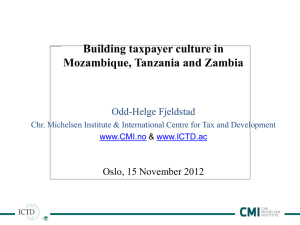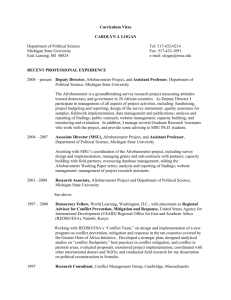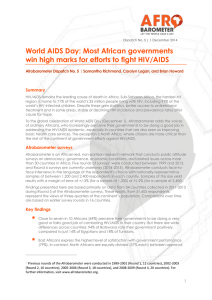Regional database DFID – African sub-national regions
advertisement
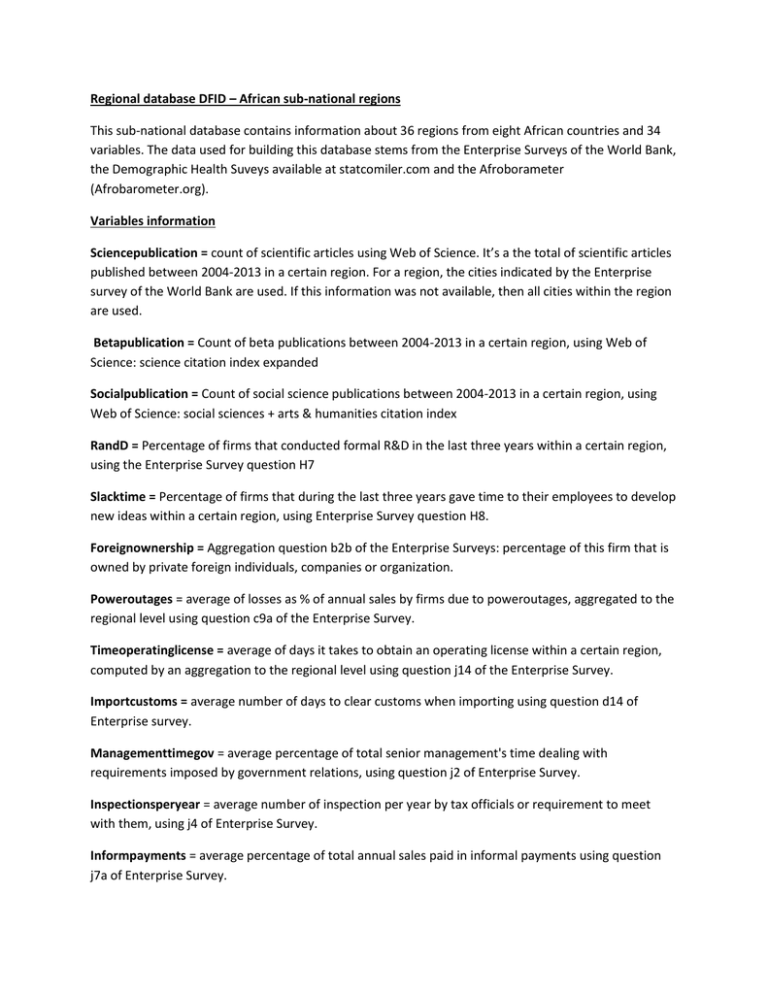
Regional database DFID – African sub-national regions This sub-national database contains information about 36 regions from eight African countries and 34 variables. The data used for building this database stems from the Enterprise Surveys of the World Bank, the Demographic Health Suveys available at statcomiler.com and the Afroborameter (Afrobarometer.org). Variables information Sciencepublication = count of scientific articles using Web of Science. It’s a the total of scientific articles published between 2004-2013 in a certain region. For a region, the cities indicated by the Enterprise survey of the World Bank are used. If this information was not available, then all cities within the region are used. Betapublication = Count of beta publications between 2004-2013 in a certain region, using Web of Science: science citation index expanded Socialpublication = Count of social science publications between 2004-2013 in a certain region, using Web of Science: social sciences + arts & humanities citation index RandD = Percentage of firms that conducted formal R&D in the last three years within a certain region, using the Enterprise Survey question H7 Slacktime = Percentage of firms that during the last three years gave time to their employees to develop new ideas within a certain region, using Enterprise Survey question H8. Foreignownership = Aggregation question b2b of the Enterprise Surveys: percentage of this firm that is owned by private foreign individuals, companies or organization. Poweroutages = average of losses as % of annual sales by firms due to poweroutages, aggregated to the regional level using question c9a of the Enterprise Survey. Timeoperatinglicense = average of days it takes to obtain an operating license within a certain region, computed by an aggregation to the regional level using question j14 of the Enterprise Survey. Importcustoms = average number of days to clear customs when importing using question d14 of Enterprise survey. Managementtimegov = average percentage of total senior management's time dealing with requirements imposed by government relations, using question j2 of Enterprise Survey. Inspectionsperyear = average number of inspection per year by tax officials or requirement to meet with them, using j4 of Enterprise Survey. Informpayments = average percentage of total annual sales paid in informal payments using question j7a of Enterprise Survey. Overdraftfacility = percentage of firms with an overdraft facility using question k7 of Enterprise Survey. Accesstofinance = percentage of firms that identifies access to finance as a major constraint using question k30 of Enterprise Survey. Loan = percentage of firms with a credit or loan from a financial institution using question k8 of Enterprise Survey. Education = percentage of respondents with secondary education or higher, using the Demographic and Health Survey available on statcompiler.com. Electricity = percentage of households with electricity within a certain region, using the Demographic and Health Survey available on statcompiler.com. Literacy = percentage of women who are literate within a certain region, using the Demographic and Health Survey available on statcompiler.com. Trust = percentage of people that can be trusted using the Afrobarometer question 87 (Q87): Generally speaking, would you say that most people can be trusted or that you must be very careful in dealing with people? percentage of people that thinks that most people can be trusted. Trustrelatives = percentage of people that trust relatives a lot, using the Afrobarometer question 88a. (Q88A). Freedomofspeech = Average of the aggregation of the question: In this country, how free are you to say what you think? Using question 17A (Q17A, four answer categories: not at all, not very free, somewhat free, completely free) of the Afrobarometer. Freedomtojoinpolitcalorganization = Average of the aggregation of the question: In this country, how free are you to join any political organization you want? Using question 17B (Q17B, four answer categories: not at all, not very free, somewhat free, completely free) of the Afrobarometer. Freedomtovote = Average of the aggregation of the question: In this country, how free are you to choose who to vote for without feeling pressured? Using question 17C (Q17C, four answer categories: not at all, not very free, somewhat free, completely free) of the Afrobarometers. Paidjob = percentage of people with a paid job, full time or part time, compared to all people, using question 96 (Q96) of Afrobarometer. Unemployed = percentage of people looking for a job compared to people working full time or part time using question 96 (Q96) of Afrobarometer. Wealthpoor = percentage of people with no radio, television, motor/car/motorcycle, using question 90 (Q90) of Afrobarometer. Wealthrich = percentage of people with 3 wealth assets (radio, television, motor/car/motorcycle), using question 90 (Q90) of Afrobarometer. Nointernet = percentage of people that never uses internet, using question 91b (Q91B) of Afrobarometer. Interneteveryday = percentage of people that uses the internet every day, using question 91b (Q91B) of Afrobarometer. Nocomputer = percentage of people that never uses a computer, using question 91a (Q91A) of Afrobarometer. Computereveryday = percentage of people that uses a computer every day, using question 91a (Q91A) of Afrobarometer. Ownphone = percentage of people with their own mobile phone, using question 92 (Q92) of Afrobarometer. Nophone = percentage of people that never uses a mobile phone, using question 92 (Q92) of Afrobarometer. Corruption = percentage of people that thinks that most or all local government councilors are corrupt, using question 60D (Q60D) of Afrobarometer (Not available for Malawi). Some data is missing, this is indicated with -9. For some regions, there were less than 10 observations, this is indicated by -7.
